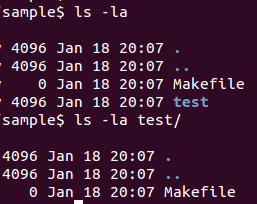Comment obtenir le répertoire relatif courant de votre Makefile?
j'ai plusieurs Makefiles dans des répertoires spécifiques d'applications comme celui-ci:
/project1/apps/app_typeA/Makefile
/project1/apps/app_typeB/Makefile
/project1/apps/app_typeC/Makefile
chaque Makefile comprend: a.fichier inc dans ce chemin un niveau supérieur:
/project1/apps/app_rules.inc
dans app_rules.inc je mets la destination de l'endroit où je veux que les binaires soient placés une fois construits. Je veux que tous les binaires soient dans leur chemin respectif app_type :
/project1/bin/app_typeA/
j'ai essayé d'utiliser $(CURDIR) , comme ceci:
OUTPUT_PATH = /project1/bin/$(CURDIR)
mais à la place j'ai eu les binaires enterrés dans le nom de chemin entier comme ceci: (noter la redondance)
/project1/bin/projects/users/bob/project1/apps/app_typeA
Que puis-je faire pour obtenir le" répertoire courant "de l'exécution de sorte que je puisse connaître juste le app_typeX afin de mettre les binaires dans leur dossier de types respectifs?
11 réponses
la fonction shell.
vous pouvez utiliser shell fonction: current_dir = $(shell pwd) .
Ou shell en combinaison avec notdir , si vous n'avez pas besoin de chemin absolu:
current_dir = $(notdir $(shell pwd)) .
mise à Jour.
la solution donnée ne fonctionne que lorsque vous exécutez make à partir du répertoire courant du Makefile.
Comme @Flimm a noté:
notez que ceci renvoie le répertoire de travail courant, pas le répertoire parent du Makefile.
par exemple, si vous lancezcd /; make -f /home/username/project/Makefile, la variablecurrent_dirsera/, pas/home/username/project/.
code ci-dessous fonctionne pour tous les Makefiles invoqués à partir de n'importe quel répertoire:
mkfile_path := $(abspath $(lastword $(MAKEFILE_LIST)))
current_dir := $(notdir $(patsubst %/,%,$(dir $(mkfile_path))))
si vous utilisez GNU make, $(CURDIR) est en fait une variable intégrée. C'est l'emplacement où le Makefile réside le répertoire de travail courant, qui est probablement où le Makefile est, mais pas toujours .
OUTPUT_PATH = /project1/bin/$(notdir $(CURDIR))
voir Annexe A Référence rapide dans http://www.gnu.org/software/make/manual/make.html
j'ai essayé beaucoup de ces réponses, mais sur mon système AIX avec gnu make 3.80 j'avais besoin de faire des choses à l'ancienne.
S'avère que lastword , abspath et realpath n'ont pas été ajoutés avant le 3.81. : (
mkfile_path := $(word $(words $(MAKEFILE_LIST)),$(MAKEFILE_LIST))
mkfile_dir:=$(shell cd $(shell dirname $(mkfile_path)); pwd)
current_dir:=$(notdir $(mkfile_dir))
comme d'autres l'ont dit, pas le plus élégant car il invoque une coquille deux fois, et il a encore les problèmes d'espaces.
mais comme je n'ai pas d'espace dans mes chemins, cela fonctionne pour moi indépendamment de comment j'ai commencé make :
- make-F../endroit/ou / makefile
- make-C..et où
- make-C ~/, là où
- cd ../où; faire
Tous me donner wherever pour current_dir et le chemin d'accès absolu à wherever pour mkfile_dir .
en regroupant les exemples donnés ici, cela donne le chemin complet vers le makefile:
# Get the location of this makefile.
ROOT_DIR := $(dir $(abspath $(lastword $(MAKEFILE_LIST))))
j'aime la réponse choisie, mais je pense qu'il serait plus utile de montrer ce travail que de l'expliquer.
/tmp/makefile_path_test.sh
#!/bin/bash -eu
# Create a testing dir
temp_dir=/tmp/makefile_path_test
proj_dir=$temp_dir/dir1/dir2/dir3
mkdir -p $proj_dir
# Create the Makefile in $proj_dir
# (Because of this, $proj_dir is what $(path) should evaluate to.)
cat > $proj_dir/Makefile <<'EOF'
path := $(patsubst %/,%,$(dir $(abspath $(lastword $(MAKEFILE_LIST)))))
cwd := $(shell pwd)
all:
@echo "MAKEFILE_LIST: $(MAKEFILE_LIST)"
@echo " path: $(path)"
@echo " cwd: $(cwd)"
@echo ""
EOF
# See/debug each command
set -x
# Test using the Makefile in the current directory
cd $proj_dir
make
# Test passing a Makefile
cd $temp_dir
make -f $proj_dir/Makefile
# Cleanup
rm -rf $temp_dir
sortie:
+ cd /tmp/makefile_path_test/dir1/dir2/dir3
+ make
MAKEFILE_LIST: Makefile
path: /private/tmp/makefile_path_test/dir1/dir2/dir3
cwd: /tmp/makefile_path_test/dir1/dir2/dir3
+ cd /tmp/makefile_path_test
+ make -f /tmp/makefile_path_test/dir1/dir2/dir3/Makefile
MAKEFILE_LIST: /tmp/makefile_path_test/dir1/dir2/dir3/Makefile
path: /tmp/makefile_path_test/dir1/dir2/dir3
cwd: /tmp/makefile_path_test
+ rm -rf /tmp/makefile_path_test
NOTE: la fonction $(patsubst %/,%,[path/goes/here/]) est utilisée pour enlever la barre oblique.
exemple pour votre référence, comme ci-dessous:
la structure du dossier peut être:
où il y a deux Makefiles, chacun comme ci-dessous;
sample/Makefile
test/Makefile
voyons maintenant le contenu des Makefiles.
échantillon/Makefile
export ROOT_DIR=${PWD}
all:
echo ${ROOT_DIR}
$(MAKE) -C test
test / Makefile
all:
echo ${ROOT_DIR}
echo "make test ends here !"
maintenant, exécutez le fichier sample/ Makefile, comme;
cd sample
make
sortie:
echo /home/symphony/sample
/home/symphony/sample
make -C test
make[1]: Entering directory `/home/symphony/sample/test'
echo /home/symphony/sample
/home/symphony/sample
echo "make test ends here !"
make test ends here !
make[1]: Leaving directory `/home/symphony/sample/test'
Explication serait que le parent répertoire/home peuvent être stockés dans l'environnement-drapeau, et peuvent être exportés, de sorte qu'il peut être utilisé dans tous les sous-répertoire makefiles.
voici un-liner pour obtenir le chemin absolu vers votre fichier Makefile en utilisant la syntaxe shell:
SHELL := /bin/bash
CWD := $(shell cd -P -- '$(shell dirname -- ""151900920"")' && pwd -P)
et voici la version sans shell basée sur @0xff réponse :
CWD=$(abspath $(patsubst %/,%,$(dir $(abspath $(lastword $(MAKEFILE_LIST))))))
tester en l'imprimant, comme:
cwd:
@echo $(CWD)
si la variable make contient le chemin relatif est ROOT_DIR
ROOT_DIR := ../../../
eux pour obtenir le chemin absolu il suffit d'utiliser la méthode ci-dessous.
ROOT_DIR := $(abspath $(ROOT_DIR))
son travail est excellent à GNUMake...
mise à jour 2018/03/05 enfin j'utilise ceci:
shellPath=`echo $PWD/``echo ${0%/*}`
# process absolute path
shellPath1=`echo $PWD/`
shellPath2=`echo ${0%/*}`
if [ ${shellPath2:0:1} == '/' ] ; then
shellPath=${shellPath2}
fi
il peut être exécuté correctement dans le chemin relatif ou le chemin absolu. Exécution correcte invoquée par crontab. Exécuté correctement dans un autre shell.
show example, A. SH print SELF path.
[root@izbp1a7wyzv7b5hitowq2yz /]# more /root/test/a.sh
shellPath=`echo $PWD/``echo ${0%/*}`
# process absolute path
shellPath1=`echo $PWD/`
shellPath2=`echo ${0%/*}`
if [ ${shellPath2:0:1} == '/' ] ; then
shellPath=${shellPath2}
fi
echo $shellPath
[root@izbp1a7wyzv7b5hitowq2yz /]# more /root/b.sh
shellPath=`echo $PWD/``echo ${0%/*}`
# process absolute path
shellPath1=`echo $PWD/`
shellPath2=`echo ${0%/*}`
if [ ${shellPath2:0:1} == '/' ] ; then
shellPath=${shellPath2}
fi
$shellPath/test/a.sh
[root@izbp1a7wyzv7b5hitowq2yz /]# ~/b.sh
/root/test
[root@izbp1a7wyzv7b5hitowq2yz /]# /root/b.sh
/root/test
[root@izbp1a7wyzv7b5hitowq2yz /]# cd ~
[root@izbp1a7wyzv7b5hitowq2yz ~]# ./b.sh
/root/./test
[root@izbp1a7wyzv7b5hitowq2yz ~]# test/a.sh
/root/test
[root@izbp1a7wyzv7b5hitowq2yz ~]# cd test
[root@izbp1a7wyzv7b5hitowq2yz test]# ./a.sh
/root/test/.
[root@izbp1a7wyzv7b5hitowq2yz test]# cd /
[root@izbp1a7wyzv7b5hitowq2yz /]# /root/test/a.sh
/root/test
[root@izbp1a7wyzv7b5hitowq2yz /]#
Vieux: J'utilise ceci:
MAKEFILE_PATH := $(PWD)/$({0%/*})
il peut indiquer correct si exécuté dans un autre shell et un autre répertoire.
